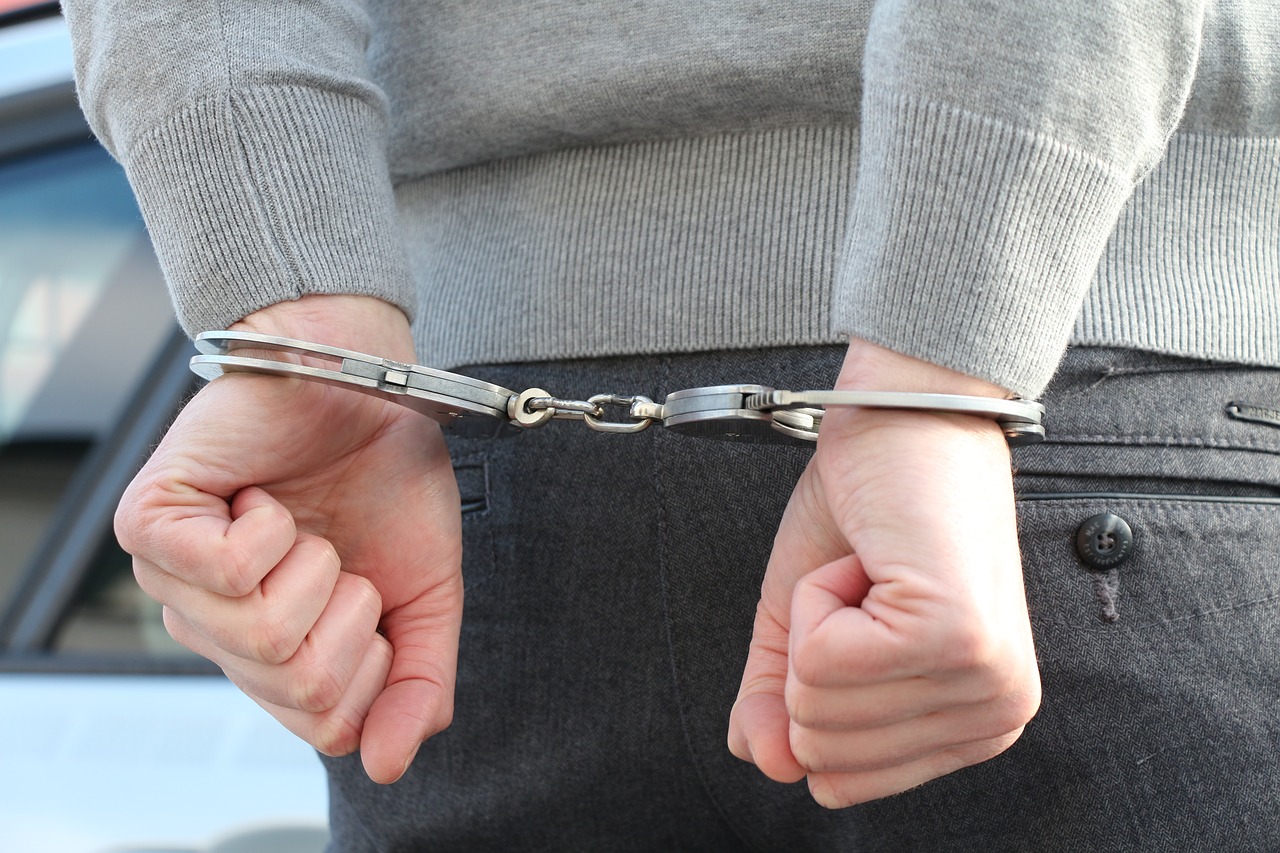Disabled veterans can receive disability benefits in most cases. However, some circumstances could prevent a veteran from being eligible for disability benefits. Willful misconduct is one of the factors in a case that could result in denial of VA disability benefits.
Willful Misconduct and VA Disability Compensation
Behaviors that might qualify as willful misconduct and could jeopardize your VA disability benefits include:
- Tobacco Use
- Alcohol Consumption
- Drug Addiction
- Reckless Driving
- Suicide or Self-Injury
Only certain types of willful misconduct result in the denial of VA disability benefits. Behavior that fits into the definition of willful misconduct can also prevent a veteran from receiving other benefits, such as vocational rehabilitation. However, if the veteran has another service-related disability that is not caused by the veteran’s misconduct, the veteran could still receive disability and other benefits.
What Is Willful Misconduct?
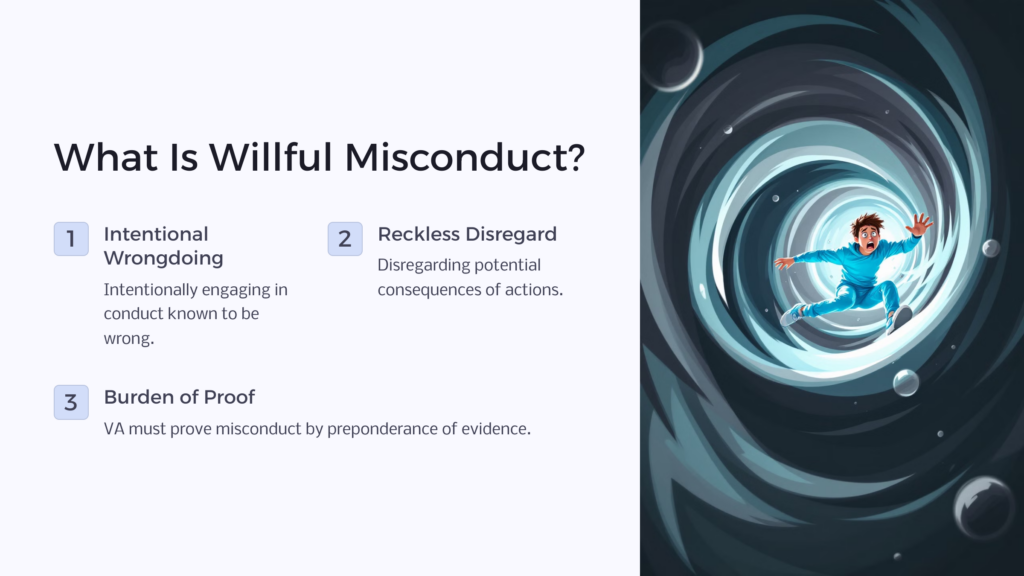
The VA defines willful misconduct as intentionally and knowingly engaging in conduct that you know to be wrong or prohibited without caring about the consequences. A person engaging in willful misconduct knows that the behavior has risks but continues with the behavior anyway. There is a reckless disregard for the potential outcome or consequences of the action.
We need to take care of our service members and make sure that their military service is honored. A disability claim is not a workers compensation claim filed by an employee with an employer. It is not a pension claim. If a person’s willful misconduct resulted in their disability, then a denial of disability benefits may be warranted. However, if the veteran did not engage in conscious wrongdoing, they deserve health care, disability, pension, and all other benefits available from the government.
What does willful misconduct mean for my disability case?
The Department of Veterans Affairs (VA) denies disability benefits in cases involving willful misconduct, even if the veteran meets all other requirements to be eligible for disability benefits. If a veteran dies because of misconduct, the VA may also deny survivor benefits for spouses and dependents.
However, if your disability occurs while serving on active duty, there is a presumption against willful misconduct. In other words, the VA has the burden of proving that your willful misconduct caused your service-related disability or death.
Unfortunately, the burden of proof is by a “preponderance of the evidence.” That is not a very high standard of proof. The VA only needs to show that the evidence demonstrates a greater than 50% chance that the allegations are true.
A claimant has the right to go to court to present a willful misconduct defense. They have the right to argue against allegations of negligence, gross negligence, and contributory negligence. The VA must provide evidence that a VA claim for disability benefits should be denied based on veteran’s reckless disregard for the consequences of their misconduct.
What Are Some Examples of Military Willful Misconduct?
The above list of behaviors contains just a few examples of the type of behavior that could fall under the VA’s definition of willful misconduct. Simple negligence could lead to a denial of disability pension benefits.
Tobacco Use
In the past, the VA would approve disability benefits for tobacco-related illnesses. However, this is no longer the case. The VA considers tobacco-related disease as being the result of willful misconduct. Tobacco use can include smoking cigarettes and chewing tobacco.
Can I get benefits for disability caused by smoking?
There are exceptions made for veterans who develop tobacco-related illnesses after using tobacco because of service-connected PTSD (Post-Traumatic Stress Disorder). In these cases, the veteran could still receive disability benefits even though the disease or illness was caused by what would be considered willful misconduct in other cases.
Alcohol Consumption or Abuse
Consuming alcohol does not disqualify a disabled veteran from receiving disability benefits. The VA is not saying that drinking alcohol is willful misconduct in and of itself.
However, if consuming alcohol results in a disabling condition, the veteran could be denied disability benefits. Consuming alcohol to enjoy the intoxicating effects can be considered willful misconduct.
The VA determines whether consuming the alcohol was the proximate cause of the veteran’s disability or death. If so, the VA considers consuming alcohol willful misconduct for disability purposes.
Examples of alcohol use that could result in a denial of a disability benefits claim include, but are not limited to:
- Personal injury caused by drunk driving
- Tripping and falling while intoxicated
- Accidentally causing a fire after consuming alcohol
- Getting into a fight while drunk
- Accidentally discharging a gun after drinking
- Developing a disease related to alcohol abuse, such as liver disease
Tying the cause of your disability to alcohol consumption is the key factor in saying that your misconduct resulted in your disability.
How can I qualify for VA benefits for alcohol addiction?
The VA defines alcohol abuse as consuming alcohol for an extended period of time. The consumption of alcohol must be excessive and done to enjoy the intoxicating effects. Under most circumstances, alcohol abuse is considered willful misconduct and results in a denial of disability benefits.
However, if alcohol abuse or alcoholism was not a product of willful misconduct, the veteran could be entitled to disability benefits. For example, suppose a veteran is diagnosed with PTSD and uses alcohol to cope with symptoms. In that case, the veteran may receive disability benefits if the alcohol use causes an injury or illness, such as liver damage. The key is to prove that the underlying factor in causing the disability was not the veteran’s wrongful acts.
Drug Addiction
Drug addiction is similar to alcohol abuse. The drug use must be the direct and proximate cause of the disability for the VA to deny disability benefits.
The VA defines drug abuse as using drugs to enjoy getting intoxicated. The use of the drugs does not have an intended medical use. The drugs are illegal or prescription drugs that were obtained illegally.
As with alcohol use, if the drug use resulted from a service-connected disability, the VA may approve disability benefits for an injury or illness. PTSD is often a reason why many veterans use illegal drugs. The use of the drugs is not to enjoy the intoxication caused by the drugs. Drugs are used to cope with the symptoms of PTSD. Another example might be a veteran obtaining prescription pain medication to deal with a service-related injury that causes chronic pain and clinical depression.
Can I lose my VA benefits for substance abuse?
Occasional use of illegal drugs may not rise to the level of willful misconduct. The VA recognizes that many veterans cope with service-related mental health issues and disabilities. Many veterans use alcohol and drugs to cope with PTSD, depression, injuries, and other issues.
If your disability was not caused by your drug or alcohol abuse, you should not lose your disability benefits. The VA provides a variety of services to help veterans with substance abuse. Veterans can receive counseling, treatment, and other therapies through the VA.
Reckless Driving
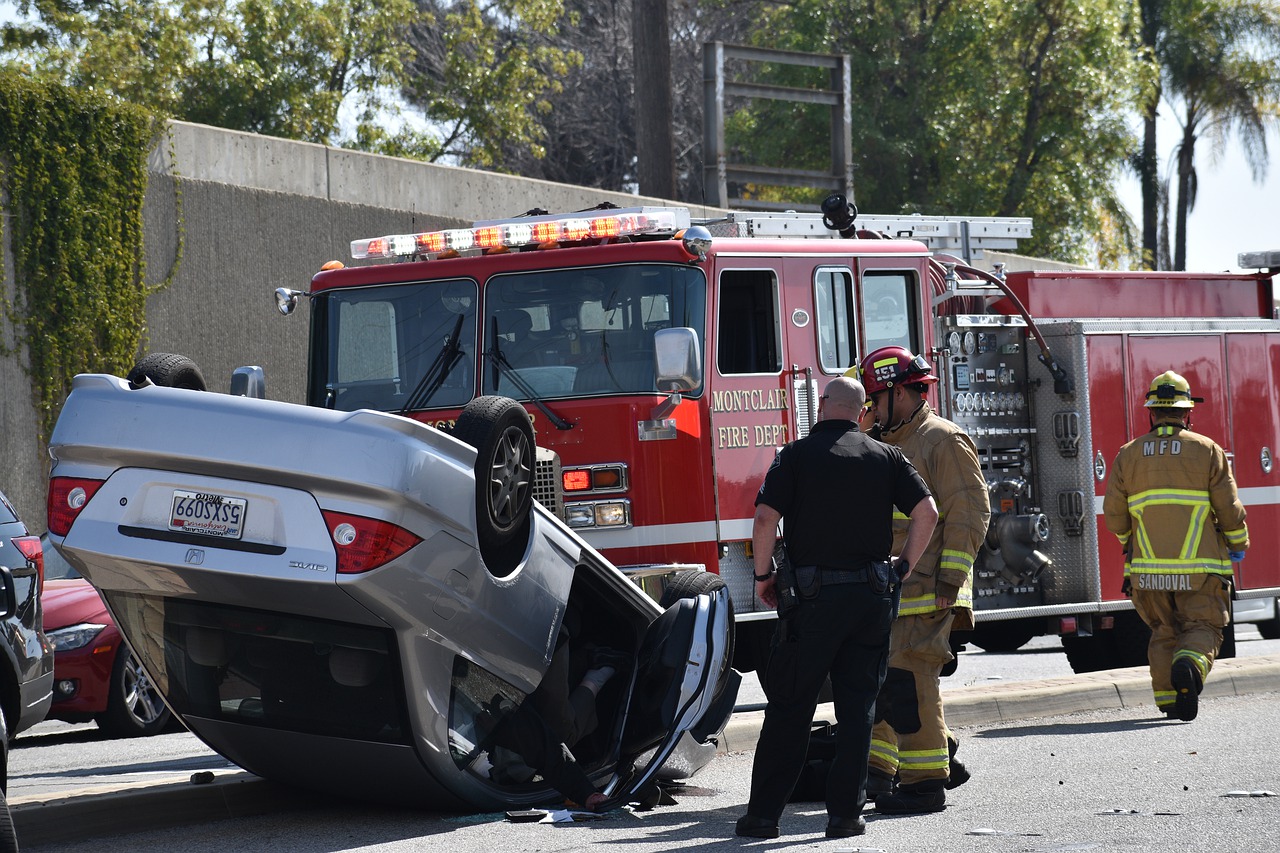
Reckless driving is just one of many examples of willful behavior that can lead to an injury or death. Driving at excessive speeds, making dangerous lane changes, and tailgating are a few examples of reckless driving. An individual decides to engage in this behavior, even though they know they could cause a traffic accident resulting in death or injuries.
When a veteran engages in reckless driving or other reckless behavior, the VA may deny disability benefits for willful misconduct. It is up to the veteran to prove that their disability did not result from their reckless behavior.
Suicide or Self-Injury
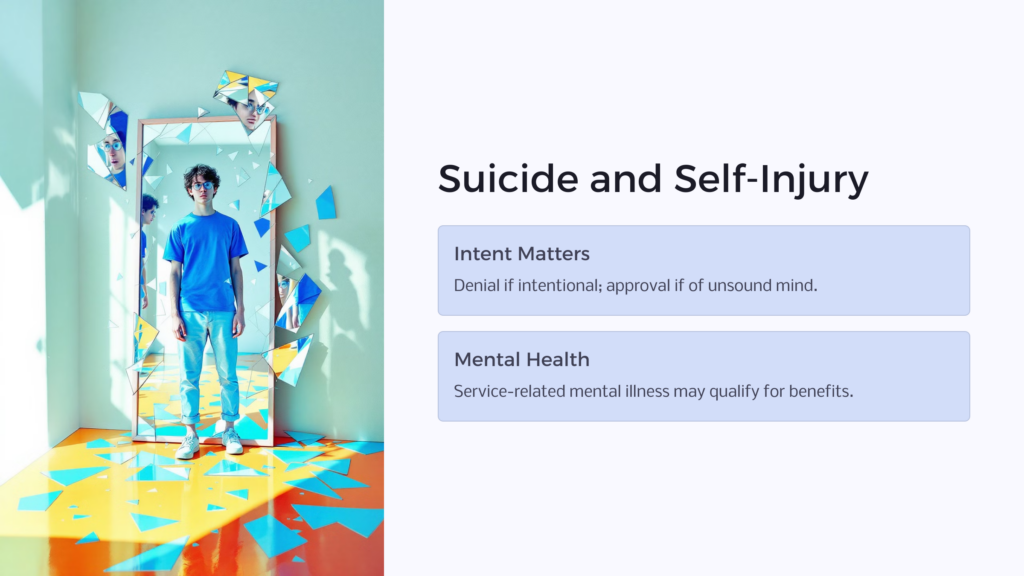
Suicide and self-injury are common among veterans. A study released by the Department of Veterans Affairs estimated that 22 veterans commit suicide each day in the United States.
If a death or injury occurs because of suicide or attempts of self-injury could result in a denial of VA disability benefits. If the VA deems that the veteran was of sound mind, the suicide was intentional, and it will deny disability or survivor benefits. However, if the veteran is of unsound mind, the VA may approve disability benefits.
The VA recognizes that serving in the military can result in mental health issues. The VA provides services for veterans who suffer common VA disability claims such as:
- PTSD
- Depression
- Psychological effects of military sexual trauma
- Anxiety
- Grief
- Insomnia
- Flashbacks
- and many other mental health issues
Being of unsound mind means that the veteran did not have the capability of having the intent to take their life or intentionally inflict self-harm. While attempting to commit suicide can be considered evidence of having an unsound mind, the VA considers all evidence, including statements from medical providers, family members, and friends.
In many cases, a veteran who commits suicide or attempts suicide has a service-related mental illness. They may be suffering from clinical depression or PTSD. If this is the case, the veteran may be eligible for disability benefits or survivor benefits.
Can I Be Denied Benefits for Misconduct?
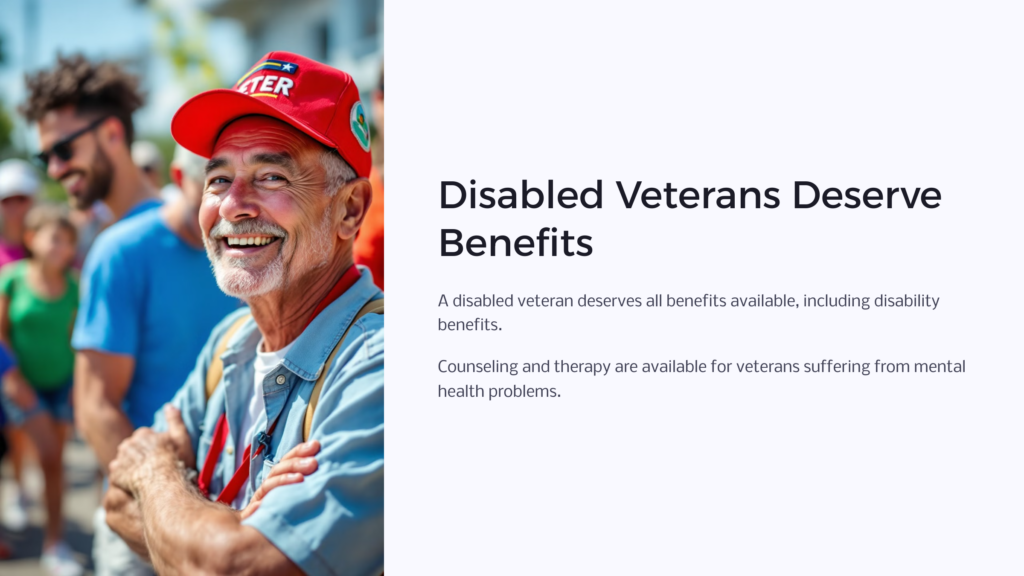
Yes, you can be denied VA disability benefits for willful misconduct. A disabled veteran deserves all benefits available, including disability benefits.
The battle to obtain disability benefits can be overwhelming and challenging, especially for veterans who may be dealing with mental health issues related to willful misconduct. Hiring an expensive disability lawyer may be the only option for some veterans seeking disability benefits. A Veterans Service Officer may also be able to help you gather your medical evidence, complete your lay statement, and submit your application for disability benefits.
A service member is at risk in combat zones. They are also at risk of injury or death while on a military base or inactive duty. Soldiers can be injured or develop service-related disabilities after they receive an honorable discharge. Disabled veterans need medical treatment and counseling, and they also need VA disability compensation.
Counseling and therapy are available for veterans suffering from mental health problems. Other services include readjustment counseling, employment counseling, and substance abuse treatment. Veterans can visit a VA office near them or call 877-222-8387 for help.
 Benefits.com Advisors
Benefits.com Advisors
With expertise spanning local, state, and federal benefit programs, our team is dedicated to guiding individuals towards the perfect program tailored to their unique circumstances.
Rise to the top with Peak Benefits!
Join our Peak Benefits Newsletter for the latest news, resources, and offers on all things government benefits.















